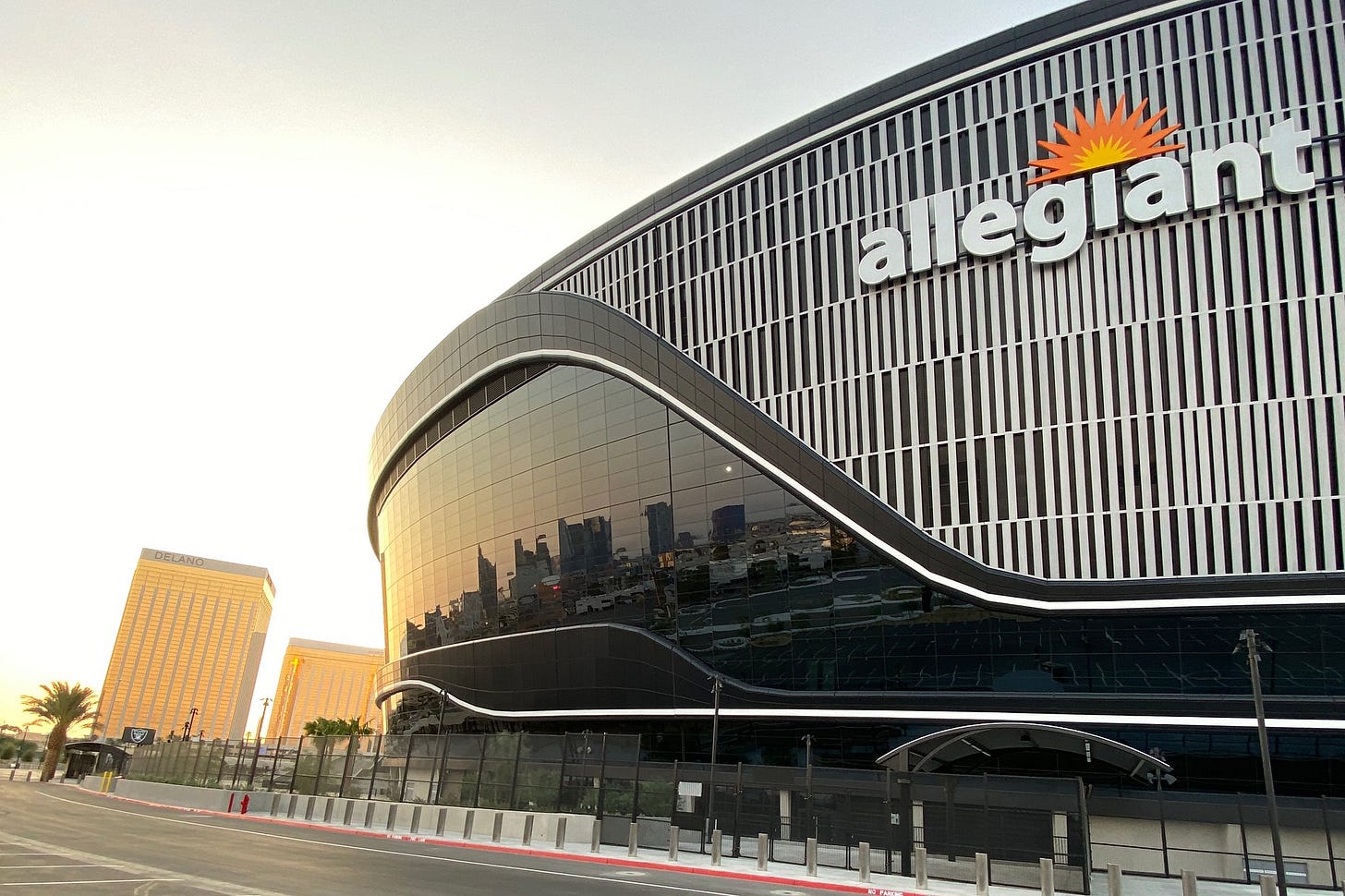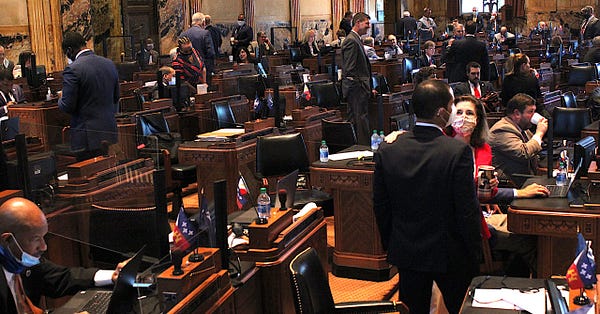
This is Boondoggle, the newsletter about corporations ripping off our states and cities. If you’re not currently a subscriber, please click the green button below to sign up. Thanks!
In 2016, the now Las Vegas Raiders received the largest stadium subsidy in American history — $750 million — to ditch their previous home in Oakland and move to Sin City. That $750 million to build Allegiant Stadium was approved by the state legislature, but ultimately came from Clark County, home to the unincorporated town of Paradise, Nevada, where most of the Vegas Strip, including the Raiders’ stadium, is actually located.
Clark County raised the money by selling bonds, which would, according to the plan, be paid back by taxes levied on hotel rooms. But things are not going according to plan.
For the second time in six months, Nevada’s Clark County has to pull millions of dollars from reserve funds to meet a payment on the Las Vegas Raiders’ one-year-old stadium.
The county disclosed in regulatory filings that it will make an unscheduled draw of $11.7 million from one of the reserve funds backstopping the $645 million in bonds issued in 2018 that helped finance Allegiant Stadium.
Clark County also had to dip into its stadium reserve fund to cover $11.6 million in bond payments in November.
The issue is that the pandemic has decimated the tourism industry, so the hotel taxes that were supposed to cover payments on the stadium debt aren’t being collected in high enough amounts, because few people are staying in hotel rooms. While the city hasn’t had to dip into its general fund yet to cover bond payments, that possibility — though remote — always exists. And including interest payments, the total cost to Clark County for these bonds is going to be about $1.3 billion. That’s some real money! (Overall, states and cities have spent tens of billions of dollars on professional sports stadiums.)
There were those of us who warned at the time that Vegas’ bet on football wasn’t going to pay off — and was also ridiculous, given that shortly before the Raiders received their publicly-funded stadium, the Las Vegas Golden Knights of the NHL started playing in an arena that was paid for with private money, right down the street. There was clear evidence sports in Vegas was an enticing enough business proposition for investors to get involved without public support, yet the Raiders received their money anyway.
Now, you may be saying, “Pat, this isn’t really fair. No one expected a pandemic to shut down tourism for a year or make it impossible for people to attend sporting events in person.” And while it’s true that there was a massive, unanticipated interruption in the business Clark County was counting on to juice revenue, that’s also the point: The climate for a particular business changes all the time for reasons legitimate and nefarious, external or internal, and thus long arrangements between a particular business and the government are always going to be risky for taxpayers.
Vegas’ plan for football being an economic driver is very dependent on it increasing tourism, since the population there is a lot smaller than that of most metro areas that host pro sports teams. Any change in tourist proclivities, due to external events such as a pandemic or simply changing interests, could render the deal a much worse one than it was on paper. The bonds aren’t fully paid off until 2048, which is plenty of time for things to go completely sideways.
Don’t believe that tourist interests can change enough to turn a previous hot spot into an economic wasteland? Just ask Atlantic City how things are going.
Then there’s this kicker, per Bloomberg News: “If the county does end up needing to back the bonds, any financial blow to Clark County will be eased by an infusion of federal aid for municipalities from the Biden administration’s American Rescue Plan.” So we’re all in this huddle together.
The saddest thing about this, to me, is that for a while Vegas did things right when it comes to stadium subsides, while most of the rest of America was doing it all wrong. Not only did Vegas refuse to put taxpayers on the hook for the Golden Knights’ arena, a coalition of concerned citizens and elected officials there blunted a push to build a publicly-funded Major League Soccer stadium in downtown Las Vegas proper. (I detailed the particulars of that debate and some of the people involved in my book, for those who are interested.)
Instead of sticking to that principle and potentially using the same increase in hotel taxes to cover $750 million worth of something worthwhile, Clark County went ahead and made the same mistake so many other cities made, betting on sports as an economic driver when all the evidence shows they are no such thing.
Legislators there forgot what recent history has shown us: Elected officials and taxpayers have more power over sports leagues and owners than they think.
And once the spigot is open, everyone wants a piece. Exhibit A: The ownership of MLB’s Oakland A’s has been visiting Vegas and talking about a new stadium, with local press already suggesting ways it could be funded by taxpayers.
This could very well just be a stalking horse to get Oakland to fund a new ballpark, but could also be serious. Time will tell. But if the A’s are intent on moving, paying for a baseball stadium would be another roll of the dice Nevada really can’t afford.
SHAMELESS SELF-PROMOTION: I spoke with Walt Hickey at Numlock News recently about, well, a little bit of everything: Apple, Foxconn, Memphis, how Congress may have accidentally given us a tool to fight corporate incentives. You can read the transcript or listen to the conversation in podcast form here. And subscribe to Numlock, because it’s excellent.
ONE MORE THING: Louisiana is one of the nation’s worst purveyors of corporate handouts, and while it made some progress a few years ago by implementing reforms I quite liked, it’s been backsliding ever since. The latest thing legislators there are doing is trying to change public records law so that information regarding the wages paid by corporations that receive incentives is no longer publicly accessible.
Wage information is key because it lets outside folks assess whether the jobs corporations are creating after they receive subsidies are good ones, or whether they’re gaming the system by, for example, putting a couple of high-paying jobs alongside a bunch of low-paying ones, while pointing to an average to claim they’re doing right by everyone.
As one local reporter in Louisiana put it:


The bill in question passed the state House, but hasn’t yet come up in the state Senate.
Thanks for reading this edition of Boondoggle. If you liked it, please take a moment to click the little heart under the headline or below. And forward it around to friends, family, or neighbors using the green buttons. Every click and share really helps.
If you don’t subscribe already and you’d like to sign up, just click below.
Finally, if you’d like to pick up a copy of my book, The Billionaire Boondoggle: How Our Politicians Let Corporations and Bigwigs Steal Our Money and Jobs, go here.
Thanks again!
— Pat Garofalo


